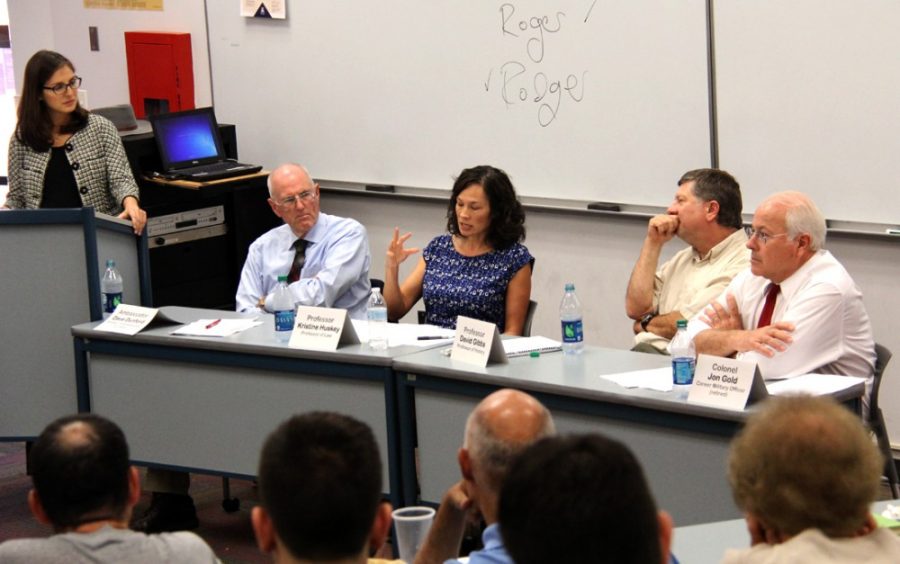A former U.S. ambassador, two UA professors and a retired military officer evaluated and commented on the Obama administration’s strategy against the Islamic State in Iraq and Syria in a public panel on Thursday afternoon.
The four panelists spoke to a packed house of students, faculty and passersby at the James E. Rogers College of Law. The conversation began with a reference to the timeliness of the panel occurring the day after President Barack Obama made a national address to announce his mission to lead a coalition to take down ISIS, and on the 13th anniversary of the 9/11 terrorist attacks.
“Let’s not have another breakdown,” said Dave Dunford, the former U.S. ambassador to Oman, in reference to the U.S.’s reaction to the attack on the World Trade Center. Dunford added that diplomacy is the key for leading an international coalition against ISIS.
David Gibbs, a history professor, agreed with Dunford’s assessment in the U.S.’s overreaction to the 9/11 attacks. Gibbs continued to say that the George W. Bush administration’s war on terror against al-Qaida is one of the greatest disasters in American history.
Gibbs added that the long-term costs incurred by the 2003 Iraq War should not be forgotten when the Obama administration considers using military force to take down ISIS.
“Doing nothing sometimes is a strategy,” said Gibbs, who authored the 2009 book, “First Do No Harm: Humanitarian Intervention and the Destruction of Yugoslavia.”
Dunford offered an overview of the Middle Eastern crisis by stating that the fall of the Sunni Muslim Brotherhood 32 years ago was the catalyst for the Syrian Civil War, which created the perfect recipe for an organization like ISIS to gain momentum.
“We cannot defeat extremists like ISIS when they have a sanctuary,” Dunford said in his explanation on why military intervention in Syria would be necessary for targeting ISIS.
Kristine Huskey, a professor of national security at the College of Law, brought up the issue of legality with Obama’s strategy to use military force in Syria and Iraq. From a domestic standpoint, Huskey said Obama can use the 1973 War Powers Resolution to order a military force, but only if Congress is given a notice 48 hours in advance.
The War Powers Resolution allows the executive office to send armed forces into hostile circumstances for up to 60 days, without officially declaring war. Huskey said after this period expires, then there is the general consensus that the president will need some kind of congressional authority if military force was to continue.
Huskey added that international law restricts the U.S. from using military force in foreign countries unless there is an imminent threat to national security. Deciphering whether or not the threat is imminent is a central issue to evaluating the legality of yielding military force in Syria.
“What the president authorized is what he was supposed to authorize,” said Col. Jon Gold, a retired military officer who served as the chief military intelligence officer in Yugoslavia.
Gold said the ISIS problem is the result of how poorly the Middle East was handled after World War I. Gold added that this trend of international conflict could escalate into a World War III scenario.
The panel ended with each of the four speakers commenting on what the country can learn from the 13 years that have passed since the 9/11 attacks. Dunford said the country needs to figure out who the adversary is clearly — before unleashing an attack. Huskey added that the country has learned to be more cautious and aware of the legality behind making decisions.
—Follow Kevin C. Reagan @KevinReaganUA









